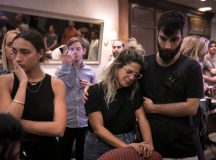Academic Judith Butler’s evolving responses to 7 October are critically examined by Cary Nelson.
When Judith Butler expressed something approximating grudging horror–if one may characterise her ambivalence that way–at Hamas’s 7 October murder rampage in Israel, in her London Review of Books essay ‘The Compass of Mourning’, dated 13 October and published 19 October, I must confess I had my doubts about whether to take it as unqualified condemnation of Hamas’s violence. She had of course years earlier notoriously insisted that Hamas must be considered part of the international left, exclusively a political movement. But now, in almost the immediate aftermath of the attack, she was explicit in characterising her own response: ‘I do condemn without qualification the violence committed by Hamas. This was a terrifying and revolting massacre. That was my primary reaction, and it endures. But there are other reactions as well.’ She prefaces her personal admission by insisting that in supplying historical context for Hamas’s violence she will assuredly not be indulging vulgar ‘relativising’ or ‘contextualisation,’ though I will argue that is precisely her agenda. In October, however, I thought I should give her the benefit of doubt. At least she was not joining the ecstatic academic celebrations of Hamas’s barbarism. But Butler has more recently complicated her supposed condemnation with additional comments. That clarifies where she stands.
Butler engaged in a delicate and rather contradictory dance in ‘The Compass of Mourning,’ repeatedly disavowing the very argumentative strategies the essay adopts. Despite those inner contradictions, Butler’s status means that her essay may prove influential, with antizionists picking and choosing among her arguments to support their views. That justifies commenting on the essay in detail. While brief rejoinders have appeared in a number of venues, I have not yet seen her essay receive a full analysis.
Later in October, Butler signed a petition urging an immediate ceasefire in Gaza. More importantly, on 3 March 2024, at a panel in Paris hosted by the French YouTube programme Paroles d’Honneur, Butler backtracked from her essay by qualifying her earlier discomfort. The key passage from the March presentation is available in video on X/twitter and YouTube . I transcribed the passage from twitter, inserting punctuation as appropriate. I take note of the audience applause toward the end because it stands in as a representative endorsement of her views. Butler has apparently redeemed herself in their eyes for what might have, in the LRB piece, seemed to be a clear condemnation of the massacre:
We can have different views about Hamas as a political party; we can have different views about, um, ah, armed resistance, but I think it is more honest and historically correct to say that the uprising of October 7th was an act of armed resistance. It is not a terrorist attack and it’s not an antisemitic attack. It was an attack against Israelis, and, you know, I did not like that attack. I have gone public with this, I have gotten in trouble for saying for me it was anguishing. It was anguishing, it was terrible. However, I would be very foolish if I then decided that the only violence in the scene was the violence done to Israeli people. The violence done to Palestinians has been happening for decades. This was an uprising that comes out, that comes from, a state of subjugation and against a violent state apparatus. OK. Let us be clear. You can be for or against armed resistance, you can be for or against Hamas. But let us at least call it armed resistance, and then we can have a debate about whether we think it’s right or whether they did the right thing, whether a different strategy [audience applause]. But the problem is, the problem is if you call it armed resistance you are immediately thought to be in favour of armed resistance and in favour of that armed resistance and that tactic. It’s like actually maybe not that tactic and we can discuss armed resistance, it is an open debate.
As Israeli constitutional law professor Roy Peled, writing in Forward, points out about armed resistance, ‘No reputable definition of the term applies to breaking into civilians’ private homes on a Saturday morning and slaughtering them and their children.’ He adds: ‘Terrorism additionally has no agreed-upon legal or political definition, but reviews of the variety of available definitions widely find the view that, at its core, terrorism is “calculated, demonstrative, direct violent action without legal or moral restraints, targeting mainly civilians and non-combatants.” How does Oct. 7 not meet that definition?’
Butler was at pains in both cases to contextualise 7 October. The IHRA Definition of Antisemitism demands that we evaluate potentially antisemitic statements contextually as well. Semioticians know that meanings and connotations are potentially infinite. Indeed, they continue to proliferate. Historians similarly know that contexts are multiple, potentially infinite, and that judgment consists in part in choosing among them, deciding which contexts to emphasise or discard, and that those judgments can change over time. But for Butler, there is but one overriding context for Hamas’s violence: Israel’s long presumed history of unrelenting violence against Palestinians. And citing it is no neutral historical exercise; it is a moral imperative.
No matter how thoroughly one documents contexts for 7 October, however, the record will fall short of its destination. The savagery of that day is not only beyond justification; it exceeds any effort at explanation. Our understanding fails. Between the plausible contexts and the events themselves, the conduct of the murder teams, a gap opens up in which comprehension falters.
For Butler, despite that, the history and legacy of Israeli oppression is unitary, a singular, unmodulated application of force. She is herself an intellectual victim of the inflexible binary of oppressors and oppressed, having, in effect, been captured by its logic. For Butler and others, that binary absorbs the entire complex history of the Israeli-Palestinian conflict. For those under the sway of the consequent narrative, the long, repeated history of Arab or Palestinian rejection of two states for two peoples – beginning with the Peel Commission report of 1937, continuing with the UN partition plan of 1947, and the Israeli offers at the end of the century – amounts to a brave recognition that all peace proposals were no better than a series of deceptions.
In the LRB, Butler notably chooses not to name the forms of violence Hamas imposed on 7 October, though she does, conversely, specify the varieties of Israeli abuse: ‘relentless bombing, the killing of people of every age in their homes and on the streets, torture in their prisons, techniques of starvation in Gaza and the dispossession of homes.’ Having asserted that ‘it would be odd to oppose something without understanding it or without describing it well,’ she chooses not to detail Hamas’s actions that day. She challenges us to consider whether ‘it is morally imperative to extend our condemnation to crimes just as appalling as the ones repeatedly foregrounded by the media.’ As of 13 October, when Butler completed ‘The Compass of Morning,’ Israel had struck several hundred targets by air, but the ground invasion had yet to begin, and the massive destruction of the bombing campaign had not yet taken place. Even later, it would be difficult to equate the intimate one-on-one personal viciousness of the Hamas assaults with collateral deaths from an air campaign, horrific though they are. I am entirely unwilling to credit anything as ‘just as appalling’ as what Hamas did on 7 October. Those crimes stand in isolation from other contemporary events. Only Butler’s abstract rendering of Hamas’s brutality makes the comparison with Israel’s conduct possible.
Butler claims that ‘the dominant frame considers some lives to be more grievable than others,’ leaving us to believe ‘that one set of losses is more horrifying than another set of losses.’ But 7 October cries out for exactly that distinction. To contemplate that day, to commemorate it in memory, is necessarily to mourn the Israeli and other innocent dead and no others. In thinking about the war in Gaza that followed, we acquire a dual moral burden. But not about that singular day. Evil then had a destination, a set of practices, and a horde of guilty parties. It had monstrous agency that should not be allowed to dissipate in qualifications and excuses. She decries the assumption that ‘the only grievable people in the scene, the only ones present as eligible for grief, are the Israelis’ with ‘Israelis’ presumably serving as shorthand for the Israelis, their visitors and workers from other countries wounded or murdered on that day. Worse still, she flirts with the proposition that, given the vantage point of history since 1948, the only victims truly and fully grievable are Palestinians. In that despicable prejudice she joins the majority of the antizionist left.
When I grieve the dead of World War II, I grieve the German dead of Dresden, the Japanese dead of Tokyo and Hiroshima, the dead of the Leningrad siege, the millions of Russian dead that dwarf all other numbers, but when I grieve the Holocaust I grieve the genocide of Jews. And when I grieve 7 October, I grieve the victims of Hamas violence, dead Jews and Thai workers. I do not balance them or explain them away. I do not ask my longtime friend whose daughter and her husband were murdered in a kibbutz to grieve either the terrorists who died in tunnels under Khan Yunis or the children who died in the rubble of Gaza City. But for the rest of us these should all be separate griefs, singular in our pain and in what witness we can give to the stories of their lives.
Butler reports that she paid dearly among her antizionist left constituency for her momentary sympathy for the dead Jews of 7 October: ‘I have gotten in trouble for saying for me it was anguishing.’ In that personal light (or context) she ventures perhaps the most minimal dollop of sympathy for the slaughtered families that anyone has offered, at least as I have seen: ‘I did not like that attack.’ Only an extraordinary capacity for blind self-regard would enable her to say this. And yet she has calculated correctly. No one present castigates her; no one hisses or calls out a condemnation. She has said what a child might say: I don’t like that flavour taffy. I don’t like those mean people. That will now stand for her judgment about the worst antisemitic assault since the Holocaust.
In Paris, Butler made explicit the conclusion that was only implicit in her LRB essay: ‘It is not a terrorist attack and it’s not an antisemitic attack.’ It is at best morally bankrupt for Butler to deny that antisemitism – here the ecstatic pleasure of butchering Jews – played no role in the 7 October murders. Indeed, it is not just the attack itself but also Butler’s reasoning that is irredeemably antisemitic. If we doubted that Jewish self-hatred played a role in the antizionism of her Parting Ways, we should put that doubt to rest.[1]
Writing in Haaretz on 7 March, Etan Nechin reports ‘bewilderment that one of the most prominent feminists of their generation, had not called out the use of rape on 7 October’. Like so many politically conflicted feminists of the new millennium, Butler neither in LRB nor, so far as we know, in Paris singled out the unspeakable hatred of women materialised in Hamas’s sexualised violence of that day. The context for that violence includes the long tradition of honour killings of women that is still part of Palestinian culture. It includes the suppression of women embraced by Hamas’s Iranian sponsors. And it insists that Jewish women are uniquely deserving of our homicidal contempt. As Batya Ungar-Sargon declared in a 7 March Telos symposium, ‘Sexual Violence, Feminism, and the Hamas Massacre’,
Leftist women found nothing in their hearts to say about it–for months. There was a total failure of the international feminist community to stand up for the Israeli women who had been brutalised by Hamas in a particularly sexual way … And then they turned around and said, well, does shooting nails into a woman’s vagina truly count as rape? Does chopping off their breasts really count as a sexual war crime? Would our Hamas, who after all are very religious, ever rape anyone?
Butler, courageously, assures us she didn’t like any of this. But she has an especially despicable way of trivialising or normalising it. It is a tactic. Was it the best tactic? The right tactic? Let’s have a rational discussion. In retrospect, ‘like actually maybe not that tactic’ was best, perhaps another one would have been better. After all, some of the terrorists killed women first and then raped them, a much less painful option. There are tactical choices to be made, though for her none of them in this context are antisemitic. Like many others among her compatriots, Butler assigns it all to ‘armed resistance.’ When mounting armed resistance against Israelis, everything is permissible. Nothing is morally out of bounds.
Writing in Haaretz on 21 March , Eva Illouz reminds us that Butler’s Paris remarks were delivered not in short-term doubt the day after 7 October but after the publication of several investigative reports:
in the face of the extreme sexual violence suffered by Israeli women at the hands of Hamas members, in the face of reports and investigations by the New York Times, lawyers, doctors, NGOs, journalists, and civilians, all of whom have testified to extreme sexual violence (including genital mutilation, bloodied naked women’s bodies, vaginas with nails inserted, breasts cut off with a knife, and women who were tied up with ropes and then shot in the face), faced with the world-wide images of a young woman killed and paraded on a Gaza street to the chants of the crowd, what does Judith Butler tell us? That they want evidence. “Whether or not there is documentation for the claims made about the rape of Israeli women” – a sceptical grimace – “OK, if there is documentation then we deplore that, but we want to see that documentation.”
That is the context, not the partial siege that remains of the Israeli occupation of Gaza. Not only the Palestinian lust for all the land between the river and the sea. Not only the desire to carpet Palestine with Jewish dead. The context is a zone of permissive hatred, a rupture in value and faith, in which evil triumphs. Ungar-Sargon again: the political valorisation of such armed resistance ‘is built on a belief system that has erased the difference between right and wrong.’ The resistance of the oppressed is the only true justice we need. Their resistance is good and just no matter what form it takes. Butler won’t say the Jews got what they deserved, but that is what she clearly implies.
Her LRB essay was founded on an appeal to reason. ‘Do we not need a critical and informed assessment of the situation to accompany moral and political condemnation…?’ Well, I cannot avoid pursuing a detailed analysis; that’s what I do. But moral outrage grounded in horror in the face of the atavistic assault carried out by Hamas is an independent necessity. It should not be dependent on either a historical account or an assessment of the perpetrators’ motivations. I’ve read scores of books on the Holocaust, taught and written about Holocaust literature, but my understanding of the moral status of the Holocaust is not dependent on contextualisation within German history. Certain moral offences are so great that they substantially detach themselves from their explanatory contexts. I believe Hamas’s offences on 7 October have that status. On balance, Butler would have us conclude they do not.
Butler insists that moral outrage detached from contextual understanding is ‘arguably both anti-intellectual and presentist.’ That is a remarkably insensitive accusation to wield against those who lost friends and family on 7 October. But it also misrepresents the emotions available to them or to Jews anywhere. The events that day were unbearable; they installed what may prove an intergenerational psychological wound. To recognise their status is not to succumb to a thoughtless presentism. 7 October constitutes a present that is simultaneously time bound and outside time. Pure moral outrage seems to me unachievable. Perhaps there are those who can unproblematically adopt ‘condemnation alone,’ not in tension with other responses, but they are not likely among those reading the London Review of Books. Butler testifies to being ‘sick to my stomach for days’; so be it. Perhaps that is one quotidian way in which moral outrage can be complicated, but it is not the only one. Butler mounts a simplistic, inaccurate response in order to critique it.
By the time Butler mounted her outrage at moral outrage, a wave of antisemitism was already sweeping the world. Meanwhile, there were already Jewish communities in the West more occupied with fear of violence than with moral outrage. The sense of vulnerability and exile within the nations of the diaspora was more intense than it had been in decades. There is no trace of the requisite sympathy or understanding from Butler.
Butler also justifiably argues that contextualisation should not be ‘considered a morally problematic activity,’ and I have done no little historical research grounded in that principle. She goes on to say that we should not ‘capitulate to the claim that all forms of contextualisation are morally relativizing.’ But I think contextualisation does exert pressure toward moral relativisation. Moreover, history offers more than adequate evidence of moral relativism. Hamas evidently believes it is morally upright to hurl gays to their deaths off rooftops. When we say otherwise, as Butler surely would, we impose a moral position of our own. I do not believe there is transcendent warrant for doing so. It is a civilisational struggle based on competing values. If we win that battle it will not be because we are inherently right. But it does means that our values may prevail. Perhaps some Hamas members believe rape, murder, and all the other demonic forms of violence they embraced on 7 October are morally justified, that they answer to the crimes of infidels, to the heretical presence of the Zionist entity. The only way to validate an alternative morality is to eliminate Hamas as a political actor and demilitarise its territory. Butler insists ‘we cannot afford to look away from the history of injustice in the name of moral certitude,’ but we can hold two realities in mind at once: historical injustice and moral convictions.
I hold to the postmodern belief that moral certitude is an illusion, a temporary and contingent social construction. It is a choice we make–to stand for convictions others would reject. But that fragility only increases the need to do the hard work of sustaining the values we choose to endorse. Butler is hard at work to make that task impossible, to suggest we need countenance the killing of Jews in the Israeli context.
Butler sometimes approximates a moral judgment–’nothing should exonerate Hamas from responsibility for the hideous killings they have perpetrated’–but she immediately rejects any consequences: ‘At the same time, this group and its members do not deserve to be blacklisted or threatened.’ To be blacklisted might be to be denied any role in post-war governing or employment. Hardy an unreasonable fate for an exceptionally violent ‘political formation,’ especially one committed to the annihilation of an ethnic and religious minority. Not being threatened clearly includes by military assault, but it also suggests immunity from criminal prosecution for crimes committed on 7 October. What do Hamas militants and their leaders deserve, then? Counselling? An opportunity for self-reform? Forgiveness?
Her reading of the history of the Israeli-Palestinian conflict and her critique of Zionism in Parting Ways and elsewhere does evoke exoneration. In the LRB, she tries to deflect that conclusion, stating that ‘there are those who do use the history of Israeli violence in the region to exonerate Hamas, but they use a corrupt form of moral reasoning to accomplish that goal.’ On 3 March, however, she insisted that ‘This was an uprising that comes out, that comes from, a state of subjugation and against a violent state apparatus.’ That contradicts her claim that ‘we do not gain a moral or political justification for Hamas’s actions through reference to their history.’ At the very least she offers political and psychological warrant for the pogrom. Moreover, for her the ‘uprising’ entails no named actions.
Yet, unlike many antizionists, Butler does not want to deny Palestinian agency. What Hamas did is a response to ‘the pervasive and relentless violence of the Israeli state,’ but it is not simply ‘a continuation of Israeli violence.’ Hamas has its very own ‘terrifying and appalling answer’ to the question of how ‘to end settler-colonial rule’ in Palestine. For her, the pogrom was responsive, reactive, a political action no matter how appalling, which puts it outside the moral framework I believe it requires.
As with the work she has done for years, Butler’s solution to the challenge of Palestinian hatred of the Jews is humanist abstraction, a vague utopian gesture: ‘What if our morality and our politics did not end with the act of condemnation? What if we insisted on asking what form of life would release the region from violence such as this? What if, in addition to condemning wanton crimes, we wanted to create a future in which violence of this sort came to an end?’ Does she really suppose any number of people and NGOs have not been doing the work to promote a resolution of the conflict that would achieve political self-realisation for both peoples? In the past, she has been willing to allude to a one-state solution, though she never opts for practical steps instead of dreamy musing. The one-state advocates, however, are mostly keeping their heads down since 7 October. Those books and essays asserting that Hamas could evolve into a partner for peace now seem destined for permanent irrelevance. Butler instead dreams of Hamas evaporating, disappearing into the ether: ‘we might be part of the struggle for a free Palestine in which Hamas would be dissolved, or superseded by groups with non-violent aspirations for cohabitation.’ I simply ask, not knowing if exasperation should be tempered with humour: what, really, is gained by floating this sort of speculative nonsense?
Illouz’s Haaretz essay leads with its title–’The Global Left Needs to Renounce Judith Butler’–but of course the left will not do so. Indeed, the left’s hatred of Israel has made it unable to recognize that a civilizational conflict is at issue. The combination of ISIS and Hamas should serve as a contemporary wakeup call about the seriousness of the challenge we face. Critiques of Israel’s conduct of the war must not blur the distinction we need to make between world views we must support and those we must reject. The failure to do so, moreover, leads to political paralysis. There are no few on the radical left who are fond of combining visceral hatred of Israel and moral relativism with politically useless wishful thinking about possible futures for Palestine. It is now more clear than ever how dangerous this compensatory pair of impulses has proven to be. It gives licence to death and destruction and leaves us permanently in their grip. Now more than ever before visceral hatred of Israel has fused with visceral hatred of Jews. That is one legacy of the Hamas pogrom and its celebration in the academy of the West that will persevere into our future.
[1] See my Israel Denial: Anti-Zionism, Anti-Semitism, and the Faculty Campaign against the Jewish State. Washington, DC: Academic Engagement Network; Bloomington: Indiana University Press, 2019, particularly the long chapter on Butler.





































